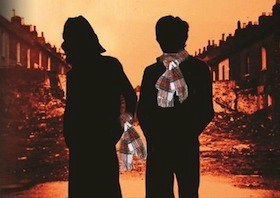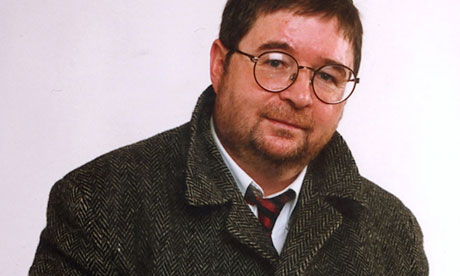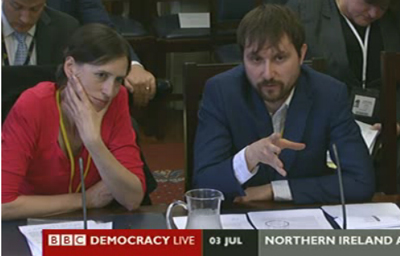Index relies entirely on the support of donors and readers to do its work.
Help us keep amplifying censored voices today.

Julia Farrington travelled to Northern Ireland to participate in the 2014 Cathedral Quarter Arts Festival in Belfast. While there she saw four plays that deal with the Troubles as head of Sinn Féin, Gerry Adams, was questioned by police.
A new mural of Adams appeared on the Falls Road in West Belfast what seemed like only a matter of hours after he was taken into custody. Officially launched by Martin McGuiness to a crowd of thousands of Sinn Féin supporters on Saturday, and it was subsequently paint-bombed. The murals, far from being memorials to past struggles, are alive and kicking.
Across town in east Belfast, I went to Bobby “Beano” Niblock’s new play — Tartan at the Skainos Centre — passing the contentious murals of balaclava wearing Ulster Volunteer Force gunmen on the way. Niblock is a rare bird in Northern Ireland as loyalist voices continue to be massively under-represented in the theatre there. The play, though heavily laced with humour and raucously re-enacted 1970s hits, had a very dark message. It tells of betrayal within the loyalist community, as TC, the teenage leader of the Tartan street gang, is mentored, manipulated and ultimately murdered by older members of the community. The level of violence in Tartan completely chilled me; the young men graduating from what were seen as boys toys — crowbars, mallets and axes — to petrol bombs, guns and the crowning awe of a machine gun.
This play of street violence and male rite of passage, was the flip side of Flesh & Blood — three plays written, produced, directed and designed by women I had seen the previous day in a run through a week before they open at the Grand Opera House. I was invited by one of the playwrights, Jo Egan, whose play Sweeties revolves around the true story of a seemingly unperturbed victim of paedophilia and the devastation it causes her complicit friend. The other two plays were by comic genius Brenda Murphy and first time playwright and former leader of the Progressive Unionist Party, Dawn Purvis. All three tell stories centre on the experience of women and girls, firmly rooted in the domestic setting of home, street and neighbourhood; in the case of Sweeties, trapped by agoraphobia in a front room, or Dawn Purvis’ play through the eyes of a young girl, watching and commenting on life on her street, with the Troubles forming the backdrop. Brenda Murphy’s play was a deeply moving portrait of her mother’s struggle to bring up six illegitimate children who she had with a married man who lived around the corner.
Those three plays were so good to see. Women playwrights are strangely under-represented all over this country, when you compare to a much more equal landscape in fiction, biography and other written forms. But hearing those voices, the reality and humour of women in Belfast, a city which I found to be so acutely male dominated, was brilliant. I laughed and cried, and came away deeply affected by the lives I had seen on stage, the courage, compassion and humour of women left to deal with the fallout of male violence.
But in all cases the stage here is seeing untold stories, and in some cases unwelcome stories, coming to the surface; retelling, unearthing, revealing complex, individual stories that are hidden within the expression of communal identity of the murals.
This article was posted on May 6, 2014 at indexoncensorship.org
A Bible-based play by acclaimed comedy group The Reduced Shakespeare company has been pulled from the stage after protests from Christian fundamentalists.
According to UTV, the company was due to perform The Bible: The Complete Word of God (abridged), at the Theatre At the Mill in Newtownabbey in Northern Ireland next week at the beginning of a UK tour. The RSC is famous for its fast-paced irreverent shows based on great texts. The group describes the Bible adaptation as “an affectionate, irreverent roller coaster ride from fig leaves to final judgement.”
But local politician Billy Ball, of Reverend Ian Paisley’s ruling Democratic Unionist Party, had called for the irreverent show to be banned. Ball is reported as saying:
For Christians, the Bible is the infallible word of God and it’s not something to be made fun of. These people are treating something sacred with irreverence and disrespect”
Mr Ball recently told the Belfast Telegraph:
“My wife, councillor Audrey Ball, has recently been put on the artistic board, so I know in future she will speak up for Christianity.
“Those against her strong beliefs better watch out.”
Today, the theatre announced via Twitter that the performances, scheduled for next weekend had been cancelled.
Show ‘The Bible: The Complete Word of God (Abridged)’ has been cancelled Apolgoises for any inconvience. Call BoxOffice for refund.
— Theatre at The Mill (@TheatreAtMill) January 23, 2014
The theatre could not be contacted at time of publication. Alderman Ball confirmed to Index that the theatre had been in contact with him about the play, but declined to comment any further on the issue, saying he would make a statement at a council meeting on Monday after it had been cleared with his party.
UPDATE (16:oo). Newtownabbey Borough Council has issued a statement confirming the decision to cancel the performances:
At the Council’s Policy and Governance Committee on Monday 20 January concerns were raised by Elected Members who had received complaints from the general public about the content and nature of the show.
Yesterday the Council’s Artistic Board held a planned Away Day, to plan and develop a strategy for the Council’s future Arts Programme. During the day, next week’s performance of ‘The Bible: The Complete Word of God (abridged) at the Theatre at the Mill was discussed by the Board.
Subsequently, the Chair of the Council’s Artistic Board, Councillor Billy Webb, has written to the Council’s Chief Executive, to confirm that, with great regret the Board has taken the decision to cancel next week’s production.
In taking this decision, the Board wishes to confirm its commitment to deliver on the agreed Council’s Artistic Policy “to deliver the highest quality performing arts programme, offering a diverse, socially relevant and enriching experience to as many citizens as possible”.
800 seats were available over the two nights and 150 tickets were sold , a 19% take up on tickets.
The approximate net costs of cancelling the show are £2000. Box Office staff are contacting ticket holders to advise them of the show’s cancellation and to apologise for any inconvenience caused.
This article was published on 23 January 2014 at indexoncensorship.org

Martin O’Hagan, murdered in 2001
Earlier this week, the Northern Ireland Attorney General John Larkin suggested that investigations and prosecutions for violence carried out during “the Troubles” (that is to say, roughly between 1970 and the Good Friday Agreement of 1998) should be quietly dropped.
The idea, though well meaning, was not well received. Northern Ireland is constantly torn between wanting to forget about the past and requiring justice for history’s victims. It’s unlikely that it can have both at the same time.
The peace process did not bring an end to violence, in spite of the official line. Dissenting groups continued shooting and maiming, albeit in lower numbers.
Among them was the Loyalist Volunteer Force, which, in 2001, took the unprecedented-in-Ulster step of assassinating a journalist.
Martin O’Hagan was an investigative reporter for the Sunday World, an old-style tabloid published in Dublin and Belfast that specialises in stories about gangsters and paramilitaries. As a result, he had been harassed by paramilitaries on all sides, including being kidnapped by the provisional IRA. (He himself had been a member of the Official IRA before giving up on the cause and going into journalism)
O’Hagan had a particular interest in the activities of notoriously violent Belfast loyalist Billy Wright, whom he nicknamed “King Rat”. In 1992, Wright, then a member of the Ulster Volunteer Force, had attempted to have O’Hagan killed. Later, Wright’s splinter group, the Loyalist Volunteer Force, had attacked the Sunday World’s Belfast office.
In 1997, Wright, by then in prison, was killed by rival prisoners in the Irish National Liberation Army (questions remain for some over how the INLA managed to sneak a gun into prison).
Four years later, in 2001, O’Hagan was gunned down. The Red Hand Defenders, an operational name for the Loyalist Volunteer Force, claimed responsibility for the murder.
Twelve years later, no one has been convicted for O’Hagan’s murder. There had been hope that a case could be built against murderers based on a Loyalist “supergrass”, Neil Hyde. But in January, prosecutors dropped the case, citing a risk of basing it on uncorroborated evidence. In September, the case was passed to Northern Ireland’s police ombudsman for investigation. Though O’Hagan’s murder falls outside Attorney General Larkin’s proposed timescale for dropping prosecutions, there seems little prospect of a conviction any time soon
On 23 November, journalists mark International Day To End Impunity, highlighting the remarkable, disturbing frequency with which attacks on reporters go unpunished. It’s very easy to imagine that these are things that only happen in Mexico or Putin’s Russia.
But Martin O’Hagan, a good journalist doing his job of uncovering wrongdoing, was killed in the United Kingdom. And his killers, from the United Kingdom, are still free.
This article was originally posted on 22 Nov 2013 at indexoncensorship.org

Mike Harris, Head of Advocacy at Index on Censorship, and Jo Glanville give evidence before the finance committee of the Northern Ireland Assembly on Wednesday.
MLAs will today be told that reform of Northern Ireland’s outdated law is needed or else the province will lose out on investment, writes Mike Harris in the Belfast Telegraph
In 2008, the United Nations Human Rights Committee condemned the libel law of England, Wales and Northern Ireland for having a chilling effect on free speech across the world.
Not only did important elements of the law pre-date the invention of the light bulb, let alone the internet, but corporations and oligarchs could bully their critics with near-impunity, silencing freedom of expression both here but also abroad.
The courts heard cases with no connection at all to this jurisdiction. One Ukrainian oligarch sued a local Ukrainian paper and a disgraced Saudi businessman, Sheikh Khalid bin Mahfouz, sued a US academic for a book not even published here.
To protect free speech, US President Barack Obama signed into law the US Speech Act to protect US citizens from the effect of English, Welsh and Northern Irish libel law, an act described as a “national embarrassment” by MPs.
Now Northern Ireland is alone with its embarrassing libel law. The law of England and Wales has been substantially reformed after the Libel Reform Campaign won support from 60,000 members of the public and over 100 charities and campaigning groups and in response the Government passed the Defamation Act.
Meanwhile in the Republic of Ireland, the Defamation Act of 2009 made modest changes to update the law to reflect the internet age and improve the defences available to those sued.
It is extremely unfortunate that Sammy Wilson, the Minister of Finance and Personnel, personally vetoed adoption of the Defamation Bill without scrutiny by either the Assembly or the Executive.
The worry is that “libel tourists” such as corrupt businessmen, powerful vested interests and global corporations may begin to use the High Court in Belfast to silence their critics using Northern Ireland’s unreformed law.
When we started our campaign, we asked people to tell us what had been censored using the libel laws. The results were startling.
Half of GPs surveyed said libel laws were stifling debate about the safety of drug treatments. Which? told us it went through lengthy legal proceedings by a manufacturer after they lab tested child safety seats.
Mumsnet faced legal action for humorous posts on its forum. Those who spoke out on the dumping of toxic waste in Africa and the funding of terrorism were taken to court.
Chillingly, cardiologist Dr Pete Wilmshurst told us how he was being sued by a US corporation for pointing out possible problems with heart devices.
In the four years he fought his case, patients continued to have these devices implanted in their hearts. Some then needed extensive surgery to have them removed because of the fault. If his concerns hadn’t been silenced by his four-year libel case, doctors may not have recommended this treatment.
Dr Wilmshurst will be joining me, English PEN and Sense About Science to give testimony to the Finance and Personnel Committee of the Northern Ireland Assembly today after the Chair Daithi McKay personally intervened to ensure Northern Ireland has a debate about these laws.
Mike Nesbitt MLA is also working with lawyers to prepare a Defamation Bill to bring to the Assembly later this year.
While Sammy Wilson thinks there is no need for reform, other politicians beg to differ.
If Northern Ireland gets this right, it will have a law fit for the internet age that protects ordinary people and GPs, scientists and academics speaking out in the public interest.
If it fails to reform the law, it’s hard to see how it will attract internet companies with a publication rule from 1849; how it will attract academics with no public interest defence for their work, or ensure books don’t get pulped (as they have done) with little protection for comment or opinion.
England and Wales have enacted wholesale libel reform for the first time in 170 years, Northern Ireland cannot afford to miss this opportunity.